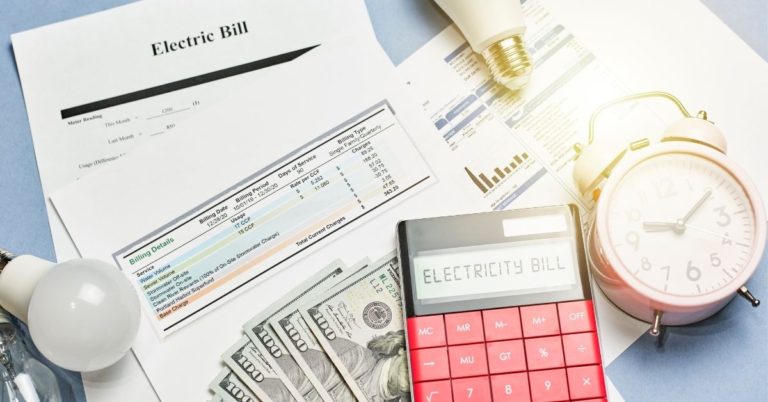3 Ways to Save Time, Money, and Energy by Putting Your Finances on Autopilot
Time is one of a teacher’s most precious–and scarcest!–resources. For this reason, we need to save ourselves as much time, money, and energy as possible by putting financial tasks on autopilot.
Habits vs. decisions–the first we don’t have to think about, which makes them so difficult to break, and the second wears us out, using up our precious time as well as our limited physical and mental energy.
Tools like automatic bill pay, automatic saving, and automatic investing can help us to achieve our financial goals as well as save us precious time. Using these tools is like having your own personal virtual assistant who will work for free!
Table of Contents
Auto pay your bills to save time, money, and energy
Think about the time and energy you spend paying your bills online or by writing out checks. Mailing checks via USPS snail mail requires a supply of stamps and envelopes, both of which cost money and create clutter. Plus, mailing paper copies of bills and checks that reveal sensitive personal and financial information poses a security risk.
Additionally, there’s the risk that you might let a bill payment deadline slip by. Missing a payment deadline will result in your having to pay a late fee. Missing deadlines with multiple bills will adversely affect your credit rating. For these reasons, when automatic payment is an option, it makes sense to save yourself time and mental energy by enrolling in it.
Most utility and credit card companies offer options for setting up your bills to be automatically paid every month. All this requires is for you to enter your bank account information, including your account and routing numbers, or your credit card account information, depending on the payment method you prefer.
The following are important things to remember when using auto pay:
- If the funds will come from your banking account, set the automatic draft date at a time when your account will have sufficient funds to cover the withdrawal
- Sign up for electronic or USPS mail notifications so you can keep track of the exact amount that is going to be drafted from your account and reconcile the debit to your balance. Similarly, if the amount will be charged to your credit card, add it to the list you are keeping of your monthly charges.
- And it’s always a good idea to have overdraft protection if your bank or credit union makes that option available to you.

Key takeaways about using auto pay
- Saves you time
- Prevents late and missed payments
- When the option exists, enroll in overdraft protection to prevent incurring fees if an automatic payment causes you to overdraw
Auto save for the short term to save time, money, and energy
We all need to save money for covering emergency expenses as well as for meeting our short-term and mid-term financial goals. When we don’t use auto invest to pay ourselves first every month, it’s all too easy for us to spend the money that we should be saving for our emergency fund and for meeting our financial goals.
Setting up auto invest will insure that you pay yourself first every month, earmarking your hard earned money for specific purposes rather than letting it slip through your fingers and out of your bank account.
You need a minimum of two different types of savings:
- Emergency money for covering unexpected expenses, such as an expensive car repair
- One or more designated accounts or subaccounts set aside for a particular purpose, such as an expensive family trip, a new vehicle, or a down payment on a house
If you are saving for several major purchases or life events at the same time, combining the subaccounts will allow your money to earn a bit more interest. However, if you combine any of your accounts, you will want to keep track of the percentage of the account that will be used toward funding each purchase.
Setting up auto save for your bank or credit union account will keep you on track as you work toward your savings goals and eliminate the drain of your time and energy that remembering to move money into a particular account every month requires.
Because current interest rates are so low, you might consider opening an online savings account that will enable you to earn a little bit higher interest rate. My post about getting the highest interest rate on your savings provides an overview of online savings accounts. Additionally, Bankrate.com provides a list of online account providers and their current interest rates.

Key takeaways about using auto save:
- Emergency money and earmarked savings need to be liquid and accessible
- Pay yourself first every month
Auto invest for the long term to save time, money, and energy
Money that we will use for retirement and other life events in the distant future needs to be invested in longer-term securities to prevent our losing too much purchasing power to inflation. These funds need to be working hard for us, growing and compounding, rather than losing purchasing power by sitting in an account that is paying minimal interest.
But there is another HUGE reason why you should auto-invest in some of these long-term types of accounts, such as the ones that I will tell you about: Pay close attention to what comes next.
By investing your pre-tax dollars, you are reducing your taxable income. Reducing your taxable income saves you money in the short term because you will not pay as much in annual income taxes! You can use the money you save to pay down debt or for other worthwhile reasons.
Sounds great, right? So let’s look at some of the different types of long-term investment options.
Overview of some long-term tax-deferred investment options for teachers
State- or employer-sponsored teachers’ supplemental retirement plans
Although state sponsored retirement plans are offered in most places, not every state offers one. My home state of Alabama, for example, offers a single defined-benefit pension plan, the Teachers’ Retirement System of Alabama. Most states offer some type of state sponsored retirement plan, although a teacher’s options can differ from one state to the next. If your state offers this type of plan, in most cases your employer will deduct your monthly contribution automatically.
457(b) plans
Many states offer teachers and other state employees the option to have one or more other types of voluntary retirement accounts. The IRS’s website provides detailed information about 457(b) accounts.
Alabama, for example, offers RSA-1, a deferred compensation plan that is a 457(b) account. (The “457” number just refers to the Internal Revenue Service’s tax code.) One of the greatest things about Alabama’s RSA-1 program is that there are no investment-related fees–and fees are one of an investor’s worst enemies! With RSA-1, every penny of your hard-earned money that you put into the plan will be working for you, growing for the future!
The RSA-1 website provides clear and easy to understand resources that will show you the specifics about why you should choose RSA-1:
- No fees
- Deferring to RSA-1 equals tax savings
- Effects of saving over time
- The power of compounding
- The advantage of beginning early
Another huge benefit of a 457(b) plan is that you can withdraw your money at the time of your retirement without incurring a tax penalty, even if you retire before age 55. In Alabama, for example, a teacher whose retirement benefits fall under the Tier I plan might choose to retire as early as his or her late 40s.
403(b) accounts
Another way to save pre-tax income is through a 403(b) plan, which is similar to a 401(k) plan. The main difference between these two types of investment plans is that 403(b) plans are for employees of non-profit organizations, such as school systems, while 401(k)s are for people who work in the for-profit sector, such as employees of a business or corporation.
As with a 457(b) account, a 403(b) account provides you with a way to invest your pre-tax income. Reducing your taxable income saves you money in the short term because you will not have to pay as much in income taxes. The IRS’s website provides detailed information about 403(b) accounts.
Key takeaways about 457(b) and 403(b) accounts
- These accounts allow you to harness the power of compound interest, growing your investment over time
- Investing in these types of accounts enables you to reduce your taxable income, saving you money on your income taxes
- Tax law allows you to have BOTH a 457(b) and a 403(b) account, subject to the annual deferral limits. The IRS’s website provides detailed information about annual contribution limits
Long-term tax-deferred investment options offered through investment companies
IRAs
Even if you already have a 457(b) and/or a 403(b) through your employer, you can still have an Individual Retirement Account (IRA) that you would open on your own through an investment company. Anyone with earned income can open an IRA.
The different types of IRAs include the following:
- Traditional IRAs
- Roth IRAs
- SEP IRAs
- Simple IRAs
Each type of IRA has different rules regarding eligibility, taxation, and withdrawals. The IRS’s website provides a clear overview of the different types of IRAs mentioned above.
Long-term taxable investment options offered through investment companies
Brokerage accounts
Besides saving for retirement and other life events in the distant future, opening a brokerage account to which you make monthly contributions will enable you to build another type of investment that you will be able to access before your retirement years without incurring a tax penalty, if you choose to withdraw some of the money.
As you begin exploring the multitude of types of investments available to you, give careful consideration to index funds. Because index funds mirror the performance of a market index, such as the Standard and Poor 500 (S&P 500 index), many–though not all–index funds are passively managed. Passive management allows investors to keep more of their returns because they are paying less money in fees and management costs.
Selecting an investment company
As you are choosing an investment company, one of the main things you need to remember is that high fees, expenses, and other hidden costs are your enemy in your quest for amassing wealth and financial security.
Investment expert Daniel Solin offers the analogy of hungry hogs at a huge feeding trough to illustrate the way most investment companies line their own pockets at the expense of the individual investor. We don’t want to give away our hard-earned money to the hungry investment companies, do we? Of course we don’t!

In order to hold on to as much of your money as possible, you want to invest with a company that offers an excellent selection of index funds with low management fees and helpful, honest customer assistance and service.
My top three recommendations for investment companies are Vanguard (the company that I have used since the 1990s), Fidelity, and T. Rowe Price.
Contact information for each company mentioned above follows:
Fidelity Investments
www.fidelity.com
800-343-3548
T. Rowe Price
www.troweprice.com
800-638-5660
Vanguard Group
www.vanguard.com
877-662-7447

Key takeaways about investing for the future:
- Your financial future depends on what you do today
- You owe it to yourself and your family to begin saving for the future now
- Getting time on your side by investing on a regular basis is the single best way to insure you will have the money you will need later in your life
Conclusion
Life’s demands never stop, and everyone has the same 24 hours in a day. Similarly, we all have a finite amount of mental and physical energy, so we want to use it as productively as possible.

When our “to do” list keeps getting longer and longer, utilizing tools like auto pay, auto save, and auto invest will help our lives run more smoothly. Every task we eliminate from our “to do” list frees up some of our time and our limited mental focus and physical energy for pursuing interests that are more worthwhile and important to us.
Developing good financial habits enables us to put a lot of our finances on autopilot, saving ourselves a lot of time and thought that can be better spent on other things in our lives.
Join the SaveYourBestLife teacher community to insure you don’t miss any new content!







